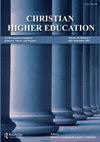Doctoral Capstone Products: A Systems Thinking Model for Quality Assurance
IF 0.5
Q4 EDUCATION & EDUCATIONAL RESEARCH
引用次数: 1
Abstract
Abstract This article draws from a keynote address presented at the 2019 Doctoral Education Forum sponsored by the Council for Christian Colleges & Universities (CCCU). A review of the literature reveals growth in doctoral education in the United States and the proliferation of types of doctoral degrees. The article describes an increase in the variety of doctoral capstone products (DCPs) beyond the dissertation, including portfolios, digital DCPs, artistic performances, interdisciplinary collaborations, and professional endeavors; the article also identifies a concomitant need for achieving and maintaining quality outcomes in all forms of DCPs, including the dissertation. Systems thinking is applied to this end by first identifying three factors—the student, faculty, and program context—as influencing the DCP process, based on a review of the literature and then analyzing the interactions among those factors which influence the quality of the DCP processes and outcomes. To holistically improve the DCP process and outcome, five principles are offered: (a) develop a program context that adheres to its standards of excellence; (b) recruit qualified students and position them for success; (c) engage qualified and committed faculty in the growth journey with students; (d) prioritize resource allocation in support of high-quality DCP production; and (e) implement a fair and appropriate DCP evaluation system. The conclusion describes possible implications for future research related to this topic within the context of Christian Higher Education.博士顶点产品:质量保证的系统思维模型
本文摘自基督教高校理事会(CCCU)主办的2019年博士教育论坛上的主题演讲。对文献的回顾揭示了美国博士教育的增长和博士学位类型的激增。这篇文章描述了在论文之外增加的各种博士顶点产品(dcp),包括作品集、数字dcp、艺术表演、跨学科合作和专业努力;本文还确定了在所有形式的dcp(包括论文)中实现和保持高质量结果的伴随需求。系统思维应用于这一目的,首先根据文献综述确定影响DCP过程的三个因素——学生、教师和项目背景,然后分析影响DCP过程质量和结果的这些因素之间的相互作用。为了全面改进DCP的过程和结果,提出了五项原则:(a)制定符合其卓越标准的项目环境;(b)招收合格的学生并使他们获得成功;(c)让合格和忠诚的教师与学生一起成长;(d)优先分配资源以支持高质量的DCP生产;(e)实施公平和适当的DCP评估制度。结论描述了在基督教高等教育背景下与该主题相关的未来研究的可能含义。
本文章由计算机程序翻译,如有差异,请以英文原文为准。
求助全文
约1分钟内获得全文
求助全文

 求助内容:
求助内容: 应助结果提醒方式:
应助结果提醒方式:


